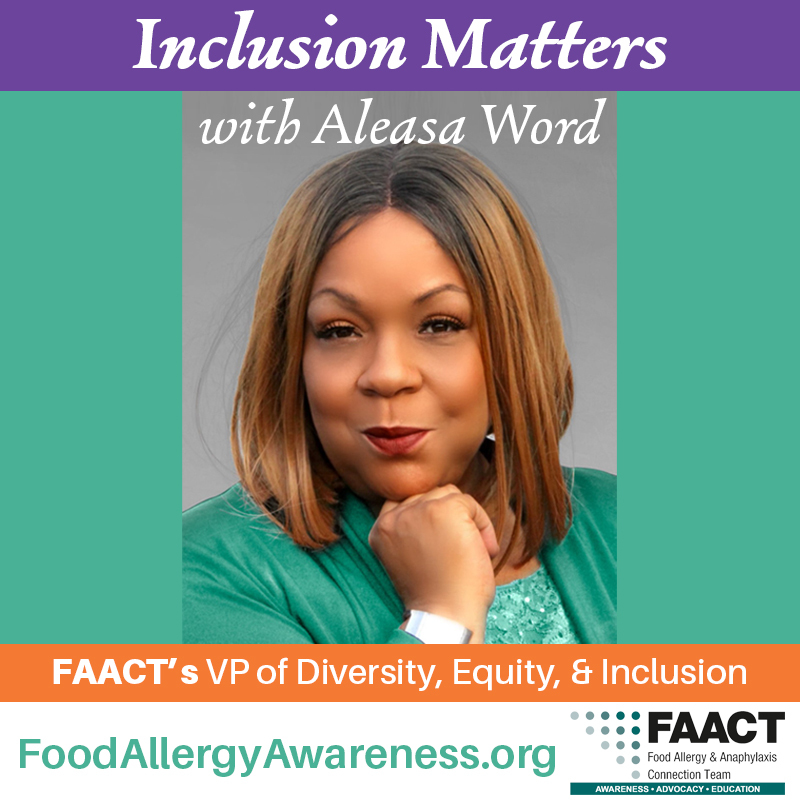Divided Holiday Season
Subcategories

Divided Holiday Season: Navigating Post-Election Emotions While Protecting Your Family and Advocating for Inclusion
by Aleasa Word, FAACT Vice President of Diversity, Equity, and Inclusion
December 2024
We made it through one of the toughest election cycles in modern history, and now the holiday season has begun. Without diving into politics, let’s focus on a practical reality: how to protect your family, maintain your sanity, and ensure that inclusion for families managing food allergies remains a priority.
Addressing the Elephant in the Room: YOUR DIVERSE FEELINGS
Let’s start with your emotions. Whether you feel joy, anger, confusion, or complete dissociation after this election, those feelings matter. Acknowledging them is the first step in navigating this challenging period. In the diversity of these feelings, beauty and curiosity are alive. Here’s why:
- Emotions drive people and the actions people take. How you feel affects how you engage with your family, your community, and your advocacy work. Think about how people are experiencing you right now and how you are experiencing them.
- Unprocessed feelings can snowball. Ignoring or suppressing emotions can lead to burnout, stress, family conflict, or even low self-confidence.
Decoding it All
- If You’re Happy: You may feel optimistic about the future and energized to push forward with inclusion efforts. Use that momentum to rally support and connect with like-minded families, medical personnel, researchers, and support groups.
- If You’re Angry: You might feel disheartened or betrayed by the outcome. Recognize this anger as a signal to channel your energy into advocacy or community building.
- If You’re Disassociated: Some may feel numb or unsure. Take time to process your feelings and avoid rushing into action until you’re ready. You may also want to seek the help of a trained professional to work through these feelings.
- If You’re Somewhere in Between: Mixed emotions are normal. Give yourself grace and focus on what’s within your control.
High Stakes for Food Allergy Families
Election outcomes affect public health, education, and accessibility policies—all of which directly impact families managing food allergies. Here are some key areas to watch:
- Healthcare Access and Insurance
- Will there be changes to coverage for life-saving medications like epinephrine auto-injectable devices?
- How might new policies affect allergist visits, testing, or treatments?
- School Policies and Community Support
- Inclusion in schools is critical for children with food allergies. Will your local or state education board prioritize food allergy policies in classrooms, cafeterias, and extracurricular activities?
- Stay informed about any shifts in funding or guidelines that may impact 504 plans or accommodations. Contact FAACT’s Vice President, Amelia Smith, JD at Amelia.Smith@FoodAllergyAwareness.org, to help you navigate this process.
- Elections often shape public attitudes. Will your community remain supportive and inclusive, or will divisive mindsets make it harder for families to advocate for their needs? We have to learn to address the problems and not attack one another.
Getting a Strategy in Place
No matter how you feel, having a plan in place will help you stay focused and protect what matters most. Here’s how to start:
- Focus on What You Can Control
- At Home: Create a safe, open dialogue around the subject in a safe space for you and your loved ones. This may mean celebrating the holidays with boundaries in place that involve a zero-tolerance rule regarding conversation around politics.
- In Your Community: Work with local support groups for managing food allergies to share resources, strategies, and emotional support.
- In Advocacy: Stay informed about policy changes and find ways to make your voice heard, whether it’s through petitions, speaking at town halls, or partnering with advocacy groups.
- Listen to Diverse Feelings and Perspectives: Help your family develop the coping tools they need to navigate post-election tensions with eight key things:
- Self-Awareness
- Empathy
- Resilience
- Common Ground
- Staying Calm in Conversations
- Leaning on Allies
- Self-Care
- Gratitude
The Bigger Picture: Inclusion Is for Everyone
Inclusion isn’t just about policies—it’s about creating a world where everyone feels seen, heard, and valued. Post-election, it’s more important than ever to keep this vision alive for families managing food allergies.
What Inclusion Looks Like When Done Right
- Accessible healthcare and medications for all families.
- Supportive school environments that prioritize safety and understanding.
- Communities that celebrate diversity and embrace differences.
Moving Forward Together
No matter how you’re feeling post-election, one thing is clear: we have to keep moving forward. Protecting our families and advocating for inclusion is a shared responsibility that transcends politics.
Take a moment to reflect on what you can do today—whether it’s having an honest conversation with your family, joining an advocacy effort, or simply offering support to another family navigating similar challenges. Together, we can ensure that progress doesn’t stall and that every family managing food allergies feels supported and included.
What’s Your Plan?
How are you navigating the post-election period as a food allergy family? Let’s learn from each other and build a stronger, more inclusive community!

